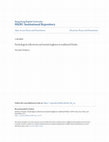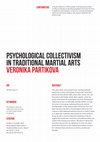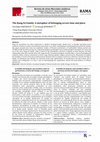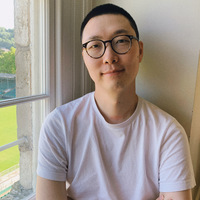Conference Presentations by Veronika Partikova

‘Kung Fu’ equates to ‘skill achieved through time and effort,’ and is commonly associated with th... more ‘Kung Fu’ equates to ‘skill achieved through time and effort,’ and is commonly associated with the Chinese martial arts, in which it can be a combat sport, self-defence and even cultural heritage. Practitioners worldwide ordinarily operate in small associations, which are often understood as ‘families’ as part of broader ‘family trees’ or lineages. This paper presents data from two studies: One, based on an ethnography of a British Wing Chun Kung Fu association, and the other, a multimodal study of European practitioners of various Kung Fu styles. Together, our analysis looks at the personal and the social by addressing both semiotic and socio-cultural contributions to the Contemporary Theory of Metaphor. Adapting this theoretical framework from a more sociological perspective, we assess the use of the term ‘Kung Fu family’, what is means to the practitioners and how it impacts on their study of martial arts and their daily lives. We argue that the conceptual metaphor of family offers a sense of belonging and solidarity within a diverse community in terms of age, ethnicity, gender, religion and social class that would otherwise contrast to a unifying idea of family. At the same time, we critically consider the metaphor in terms of the micro-political power dynamics that accompany the teaching and leadership of martial arts organisations. Overall, we suggest that the idea of (most typically) non-blood related family can help us understand how identity can transcend across both time (‘generations’ of practitioners) and place (from and to cultures, continents and contingents).
Keywords: Collective identity; metaphor; social theory; martial arts; Chinese culture.

Self-orientation in Chinese martial arts context
Drinking with your boss would probably produce a different degree of commitment than offering tea... more Drinking with your boss would probably produce a different degree of commitment than offering tea to your sifu during the Bai Si ceremony. Commonly, specific rules, habits and rituals of a kung fu community are repeated and accepted by foreigners, too. Some of these behaviors may be however very different from their own society or daily actions.
Psychological collectivism can be defined as a tendency to internalize norms of people’s in-groups and ability to understand hierarchy. Unlike the Hofstede’s macro collectivism, psychological collectivism directs attention to individual rather than the society. It describes the way we organize relationships around our own.
Chinese martial arts provide a unique environment for exploring psychological collectivism due to its strong concepts of sorted roles, such as student-master, community and transmitted philosophical influences. Is it therefore possible that psychological collectivism could be an important topic for traditional martial arts? Could it explain the functioning of foreigners inside such community and the acceptance of all its commitments? Psychological collectivism is moreover an actual topic for the sport field. Without surprise, it is said that sport teams should possess some degree of psychological collectivism to be more effective. But it nevertheless turned out that individual sports are not as individual as we thought. Indeed, close group mates can influence significantly not only the motivation of an athlete, but also the performance itself.
Since individualistic and collectivistic attributes of self are likely sampled in separated cognitive structures rather than being dichotomous, the level of individualism and collectivism may therefore differ in various contexts. Thus, different environments would have different effects. Is martial art such salient environment to influence one’s self orientation? And mainly what kind of impact would it have to the practice and theory of martial arts?

Kung fu family: Is this tradition transferable to the West?
Kung fu or traditional wushu is an umbrella term for Chinese martial arts. The background in Chin... more Kung fu or traditional wushu is an umbrella term for Chinese martial arts. The background in Chinese values and culture strongly influences the community. For example, some schools still practice the bai shi (bai si) ritual, a tea ceremony of discipleship. The main core of the group consists of teacher and the student, with others standing around the main two in a hierarchical structure, like a family. In the academia, traditional martial arts gained its attention as having significant psychosocial outcomes, which can be used for instance in therapies. Some researches argue that presence of Asian values made martial arts such effective tool, and its ability to empower self-development and cultivation made them survive until the modern days. However, there are others who simply do not believe in the transfer, and refer for example to “Western Buddhism”. Collectivism on the society level influence people in organizing their relationships around themselves, however this work on the individual’s level as well. Is it possible that foreigners create collectivistic relations inside their kung fu in-groups, even if not outside the training context? Situation is the main factor in the individual level of collectivism. Could be kung fu family then understood, accepted, and passed on by foreigners both at home and in China? The bridging of these concepts will be presented with the help of existing empirical researchers, including my previous and ongoing one. Keywords: sport and collectivism; Western Buddhism; traditional sport values

A phenomenological study of being a traditional Chinese martial arts teacher
The study will introduce a qualitative phenomenological research held to explore what is to be a ... more The study will introduce a qualitative phenomenological research held to explore what is to be a teacher of traditional Chinese martial arts by examining the structure of experience. The special attention is given to the essence of being the teacher when admitting the martial arts include certain taught strategies applicable in the fight but also in the life outside the gym. Three male teachers from Czech Republic with an average of 15 years experience and teaching in their own martial art school (club) were invited to take part in this study. A half-structured and narrative methods of interview were used in data collection. All data were further analyzed by using the Interpretative Phenomenological Analysis. The study uncovered four topics: ego, self transformation, guidance and spiritual background. The findings suggested the teachers understand themselves as a “life guide” on the path of self transformation and liberation. Moreover, the study revealed a strong and sometimes restrictive relation between the individual and the community. Finally, the style of leading the students by their teachers was identified as “guidance non-guidance” in the reference to the Taoist “wu wei” (non-action) principle.
Papers by Veronika Partikova

Open Access Theses and Dissertations, 2019
Introduction: Wushu, Chinese martial art, consists of modern and traditional groups of styles. Pr... more Introduction: Wushu, Chinese martial art, consists of modern and traditional groups of styles. Previously it was researched that modern and traditional martial arts have different outcomes. Since traditional wushu is said to be rooted in Chinese values, its environment is a unique place to research psychological collectivism. Moreover, mental toughness is a new topic in the field of martial arts, and its connection with psychological collectivism was only researched on the society, not personality level. Methods: This mixed methods research consisted of qualitative Study 1 and quantitative Study 2. Study 1 aimed to understand, what is the experience of psychological collectivism in traditional wushu training. Semi-structured interviews were conducted with eight European adult participants of traditional wushu and were analyzed using Interpretative Phenomenological Analysis. In the Study 2, 277 European adult respondents (111 modern wushu and 166 traditional wushu practitioners) filled in the Sport Mental Toughness Questionnaire and Psychological Collectivism Questionnaire. To research the relationship of practicing modern or traditional wushu with psychological collectivism and mental toughness, several steps were taken. First, the Exploratory and Confirmatory Factor Analysis were run to test both models. Next, the final model was tested using Structural Equation Modelling. Model comparisons, path analysis and effects were completed. Results: In Study 1, five themes emerged from the data. The first described how kung fu (traditional wushu) provided structure and direction for the interviewees. Also, it described how practitioners better adapted to the outer world and their ability to switch from being gentle to being ruthless. The second theme described perception of time. The third one explored the kung fu community, provided a probe into the group identity, and looked at how positioning closer to the master provided better learning options; the community served as the knowledge keeper. The fourth theme explored bridging gaps in communication. Finally, the fifth theme discovered seriousness of the practitioners, who had to endure mentally and physically torturous training. In Study 2, during the structural equation modeling the final model was confirmed as well as differences in the two groups of modern and traditional wushu. Moreover, it was found, that the number of joined competitions or years of training did not result in a significant path with mental toughness, but perceived level of skill did. The relationship between psychological collectivism and mental toughness was found only in the traditional wushu group, limited to a marginal p level. Conclusion: Psychological collectivism was explored in traditional wushu and helped to understand the structure and functioning of the wushu community. The seriousness of its members served as a commodity, to negotiate better position in the group. In the quantitative study, this seriousness seemed to be connected with the perceived level of skill. This variable resulted in the significant path with mental toughness. It is suggested that the social environment of the serious practitioners, who put themselves through demanding training, helped to develop mental toughness. This development is not based on the number of years in training, but rather on the way the practitioners perceive themselves.
European Journal for Sport and Society, 2019
The purpose of this research is to explore the nature and main characteristics of kung fu teacher... more The purpose of this research is to explore the nature and main characteristics of kung fu teachers from their own perceptions, and to understand martial arts from a distinctive lens, transcending a traditional focus on the physical aspects or psychological benefits, prevalent in much existing research. Thus, this article aims to address the gap by providing insight on how the teachers perceive themselves and their work. In-depth semi-structured interviews were conducted with three Czech teachers and analysed using an interpretative phenomenological analysis. The findings uncovered four phenomena: collectivistic group membership, self-transformation, guidance and spiritual background. Several respondents expressed the belief that one of the main goals of martial arts is not only improving fighting skills but also transforming the self.

Martial Arts Studies Journal, 2019
This paper offers a new perspective for viewing traditional
martial arts in terms of psychology. ... more This paper offers a new perspective for viewing traditional
martial arts in terms of psychology. It argues that ‘traditional’
martial arts offer physical skills, moral codes, rituals, roles, and
hierarchical relationships which, taken together, creates the
perfect environment for psychological collectivism. Psychological
collectivism focuses on individuals and their abilities to accept
the norms of an in-group, understand hierarchy, and feel
interdependence or the common faith of the group. First, this
paper introduces the theory of psychological collectivism and
connects it with traditional martial arts known as wushu or kung
fu. It argues that traditional Asian martial arts create situations
strong enough to activate collectivistic attributes of self and
suggests that practitioners’ mind-sets can be different within and
outside of the training environment. This kind of collectivistic
interaction may provide one explanation for how non-Asian
practitioners function in such training environments and how
the traditional Asian martial arts can work as psychosocial
therapies.

Kung Fu associations are often understood as 'families' forming broader 'family trees' or lineage... more Kung Fu associations are often understood as 'families' forming broader 'family trees' or lineages operating across centuries of history as well as transcultural associations. In an effort contributing to interdisciplinary martial arts studies, this paper presents data from two qualitative studies of Western practitioners of traditionalist Chinese martial arts (TCMA) in both the West and Asia by a phenomenological psychologist and an anthropological sociologist. We assess the use of the term 'Kung Fu family', what it means to the practitioners and how it impacts on their practice and their relationships with other martial artists. We argue that the conceptual metaphor of family offers a sense of belonging and solidarity within a diverse community in terms of age, ethnicity, gender, religion and social class. Meanwhile, we explore the metaphor in terms of the micro‐political power dynamics that accompany martial arts collectives. Overall, the ideal of family can illuminate how identity can transcend across time ('generations' of practitioners) and place (from and to cultures an ndence of Chinese martial arts d contingents). It is thus a way of understanding the organisation, spread and transcendence of Chinese martial arts.
Keywords: Collective identity; conceptual metaphor; Chinese martial arts; family; lineage; martial arts.









Uploads
Conference Presentations by Veronika Partikova
Keywords: Collective identity; metaphor; social theory; martial arts; Chinese culture.
Psychological collectivism can be defined as a tendency to internalize norms of people’s in-groups and ability to understand hierarchy. Unlike the Hofstede’s macro collectivism, psychological collectivism directs attention to individual rather than the society. It describes the way we organize relationships around our own.
Chinese martial arts provide a unique environment for exploring psychological collectivism due to its strong concepts of sorted roles, such as student-master, community and transmitted philosophical influences. Is it therefore possible that psychological collectivism could be an important topic for traditional martial arts? Could it explain the functioning of foreigners inside such community and the acceptance of all its commitments? Psychological collectivism is moreover an actual topic for the sport field. Without surprise, it is said that sport teams should possess some degree of psychological collectivism to be more effective. But it nevertheless turned out that individual sports are not as individual as we thought. Indeed, close group mates can influence significantly not only the motivation of an athlete, but also the performance itself.
Since individualistic and collectivistic attributes of self are likely sampled in separated cognitive structures rather than being dichotomous, the level of individualism and collectivism may therefore differ in various contexts. Thus, different environments would have different effects. Is martial art such salient environment to influence one’s self orientation? And mainly what kind of impact would it have to the practice and theory of martial arts?
Papers by Veronika Partikova
martial arts in terms of psychology. It argues that ‘traditional’
martial arts offer physical skills, moral codes, rituals, roles, and
hierarchical relationships which, taken together, creates the
perfect environment for psychological collectivism. Psychological
collectivism focuses on individuals and their abilities to accept
the norms of an in-group, understand hierarchy, and feel
interdependence or the common faith of the group. First, this
paper introduces the theory of psychological collectivism and
connects it with traditional martial arts known as wushu or kung
fu. It argues that traditional Asian martial arts create situations
strong enough to activate collectivistic attributes of self and
suggests that practitioners’ mind-sets can be different within and
outside of the training environment. This kind of collectivistic
interaction may provide one explanation for how non-Asian
practitioners function in such training environments and how
the traditional Asian martial arts can work as psychosocial
therapies.
Keywords: Collective identity; conceptual metaphor; Chinese martial arts; family; lineage; martial arts.
Keywords: Collective identity; metaphor; social theory; martial arts; Chinese culture.
Psychological collectivism can be defined as a tendency to internalize norms of people’s in-groups and ability to understand hierarchy. Unlike the Hofstede’s macro collectivism, psychological collectivism directs attention to individual rather than the society. It describes the way we organize relationships around our own.
Chinese martial arts provide a unique environment for exploring psychological collectivism due to its strong concepts of sorted roles, such as student-master, community and transmitted philosophical influences. Is it therefore possible that psychological collectivism could be an important topic for traditional martial arts? Could it explain the functioning of foreigners inside such community and the acceptance of all its commitments? Psychological collectivism is moreover an actual topic for the sport field. Without surprise, it is said that sport teams should possess some degree of psychological collectivism to be more effective. But it nevertheless turned out that individual sports are not as individual as we thought. Indeed, close group mates can influence significantly not only the motivation of an athlete, but also the performance itself.
Since individualistic and collectivistic attributes of self are likely sampled in separated cognitive structures rather than being dichotomous, the level of individualism and collectivism may therefore differ in various contexts. Thus, different environments would have different effects. Is martial art such salient environment to influence one’s self orientation? And mainly what kind of impact would it have to the practice and theory of martial arts?
martial arts in terms of psychology. It argues that ‘traditional’
martial arts offer physical skills, moral codes, rituals, roles, and
hierarchical relationships which, taken together, creates the
perfect environment for psychological collectivism. Psychological
collectivism focuses on individuals and their abilities to accept
the norms of an in-group, understand hierarchy, and feel
interdependence or the common faith of the group. First, this
paper introduces the theory of psychological collectivism and
connects it with traditional martial arts known as wushu or kung
fu. It argues that traditional Asian martial arts create situations
strong enough to activate collectivistic attributes of self and
suggests that practitioners’ mind-sets can be different within and
outside of the training environment. This kind of collectivistic
interaction may provide one explanation for how non-Asian
practitioners function in such training environments and how
the traditional Asian martial arts can work as psychosocial
therapies.
Keywords: Collective identity; conceptual metaphor; Chinese martial arts; family; lineage; martial arts.